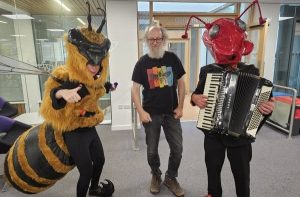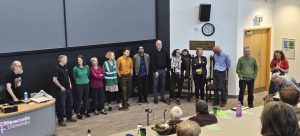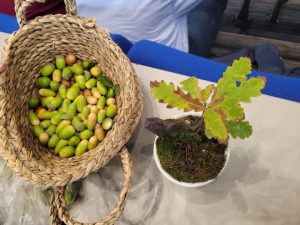Friday, September 12th, at the David Shaw Lecture Theatre at Newcastle University. The conference focused on topics including biodiversity, health, community, science, and art, bringing together a diverse group of participants dedicated to fostering a more sustainable and harmonious world. Organised by Paul Miskin of Planet Action Street Arts with the kind support of The Natural History Society of Northumbria. They brought together an amazing micro-conference fusing art and science. Climate Action Newcastle were pleased to be invited and had the opportunity for a display next to the registration desk.

Keynote Speaker
Professor Lars Chittka: A renowned scientist and author of The Mind of the Bee, a book that draws on decades of research to explore the cognitive abilities of bees. Lars, who travelled from London for the event, gave a fascinating talk featuring brilliant slides and videos. His work highlights that bees exhibit complex behaviours and that they may even possess a form of consciousness. The video clips included bee flight paths over successive day, different examples of learned behaviour and even bees at play. His presentation connected his scientific findings to broader themes of biodiversity and planetary care. (For more information: www.chittkalab.qmul.ac.uk)

Presenters and Organizations
Simon Tarrant and Marianne Sice: Simon Tarrant is an artist and curator who works on projects to provide public platforms for artists. Their joint presentation, “The dance of the insects & live music,” used artistic and musical expression to explore the world of insects. (Seen in the top photo either side of Lars Chittka)
Ben Walton (Newcastle Nature Networks): Ben Walton’s academic background is in ecology. Newcastle Nature Networks is an initiative that works to improve and connect local green spaces. His presentations connect his academic work to the practical application of building healthier urban ecosystems. (For more information: www.ncl.ac.uk/sustainable-campus/themes/biodiversity/)
Andy King (Blue Green Newcastle): A chartered engineer, Andy King is a senior advisor for the Blue Green Newcastle project. Andy presented a series of slides illustrating how to integrate nature-based solutions into the city’s infrastructure, including urban water management and the creation of green spaces. (For more information: www.ncl.ac.uk/engineering/research/research-case-studies/water/blue-green-cities/)
Mike Jeffries: An academic in the field of ecology and a prominent researcher on pond ecosystems. His talk, “Planet of Ponds,” centres on the ecological significance of these habitats. Who knew there was so much diversity in ponds. It is estimated that two-thirds of all freshwater species can be found in ponds. And not to forget mentioning their being a great carbon sink. Research, including some from Northumbria University’s own experts, has
found that the rate of carbon burial in ponds can be 20 to 30 times higher per square metre than in woodlands or grasslands.
David de la Haye: An award-winning ecological sound artist and composer. He uses specialized hydrophones to record freshwater environments. His presentation “Pondscapes: Musical Collaborations with Aquatic Plants” showcases how he uses these recordings to create art and raise awareness of aquatic life. It is fascinating how looking at life from a different perspective can not just teach us more but engage a wider breadth of society getting involved.
Jennie Maughan (Scotswood Community Garden): Jennie, who replaced Nicky Sargent, spoke very entertainingly about her school rain garden workshops and gave some amusing quotations from the kids. The garden is a community hub and permaculture space that works to inspire learning about nature and sustainable living. It delivers programs including therapeutic horticulture and environmental education. Jennie also spoke about an evolving network of community gardens. (For more information: www.scotswoodgarden.org.uk)
Mark and Diane Thurston (Canny Wild CIC): The co-founders of Canny Wild CIC, a not-for-profit social enterprise based in Jarrow. The organization works to address the decline in biodiversity and improve mental health by reconnecting communities with nature through ecological surveys, green skills training, and environmental education. (For more information: www.projectwildcic.com)
Anthony Sargent (Summerhill Trust): As Chair of the Summerhill Trust, introduced the Summerhill nature gardens and spoke for the PASA (Planet Action Street Arts) community garden coalition initiative. Maysie Sharp, Summerhill open spaces, highlighted the role of urban green spaces. She shared the history of this little known oasis and in particular the ultimately successful principle of being totally organic. (For more information: www.summerhilltrust.org.uk)
Lauren Henley (Research Climate Hub): The Research Climate Hub serves as a platform for fostering creative thinking and solutions related to the climate crisis. Lauren Henley’s work focuses on moving beyond traditional responses to the climate emergency framing a new narrative. (For more information: www.kcl.ac.uk/research/kings-climate)
Manujya Ghosh: His presentation, “Reframing Climate Responsibility: From Epic Fiction to Everyday Realities,” argues for a more equitable distribution of climate responsibility and was based on his research that has been featured in publications by the Club of Rome. Manujya also read to us a story to illustrate this idea.
John Wilson (Pesticide Free Newcastle) & Rachel Locke (Save Newcastle Wildlife): These individuals are key figures in local environmental advocacy. John Wilson campaigns for Pesticide Free Newcastle, which lobbies to end the use of herbicides like glyphosate. (For more information: www.pan-uk.org/pesticide-free/) Rachel Locke of Save Newcastle Wildlife advocates for policy changes to protect habitats from overdevelopment. (For more information: www.save-newcastle-wildlife.org.uk)
Olwyn Jay Hocking (Climate Action Newcastle): As a campaign organizer for Climate Action Newcastle, Olwyn works with a local group dedicated to promoting a cleaner environment. She shared information of what CAN are involved in and the importance of doing what you are able to do. (For more information: www.climateactionnewcastle.com)

At the close of the event bags of acorns were handed out for people to grow. This initiative was suggested by board member Shari and was made possible by local tree expert Christopher O’Connor of “the bike garden,” (greeningwingrove.org.uk/nuns-moor-park/the-bike-garden) who provided a substantial number of acorns. The choice was deliberate, reflecting the ‘out of little acorns…’ metaphor and the incredible ecological value of oak trees. Oaks support over 2,500 other species, both above and below ground, while also providing air cleaning, cooling, and water retention, with a potential lifespan of over 1,000 years. This action met our obligation to never leave out actual action from PASA events and has already taken root, as one attendee has planted three of her acorns.
Conclusion
This conference also earned praise from several notable figures. Jo Cundall, Senior Advisor for Culture at the Community Foundation North East, noted that her organisation was “really pleased to have supported Planet Action Street Arts through the John Bell Fund. Sustaining the environment is a priority impact area for us and we need forward thinking, passionate and innovative organisations like Planet Action Street Arts to drive that mission at a grassroots level”. Alison Flanagan Wood, a Council Arts Development officer, said of the City Library outdoor space: “you have totally transformed the outdoor space into a beautiful wildlife garden – it looked glorious and full of lovely blooms and plants.” Finally, Professor Seirian Sumner and Dr Gordon Port both complimented the giant insects used by Planet Action Street Arts, with Professor Sumner describing them as “exquisite street theatre with a serious edge” and Dr Port stating they bring a “wow factor” to any activity.
This conference was programmed by Planet Action Street Arts CIO charity 1198746 (for more information: www.planet-action-street-arts.com).
PASA champions both culture and climate. Every performance, project and partnership is a step toward nurturing urban spaces where pollinators, people and planet can all thrive.
It was generously supported by The Natural History Society of Northumbria (for more information: www.nhsn.org.uk), with a grant from the Community Foundation. It successfully provided a platform for participants to discuss the interconnected issues of biodiversity, community, and climate action. An additional value was the opportunity to meet and network with an amazing group of people.
The event was filmed and we look forward to when it is uploaded to www.planet-action-street-arts.com/
